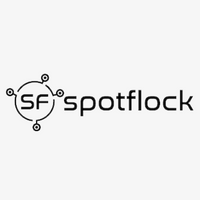
Spotflock
View Brand PublisherSpotflock’s deeptech solutions help enterprises leverage AI, IoT, and blockchain
Spotflock Technologies is using AI, IoT, and blockchain technology to help enterprises improve decision-making and self-learning processes. It is presently focused on developing real-time AI solutions for e-governance and sports technologies.
In 2017, most businesses were getting Big Data-ready but only scratching the surface with business intelligence and automation.
Sridhar Seshadri felt the need to build a platform and products that could spearhead positive societal change. His true motivation was the desire to “implement deeptech for enterprises and e-governance verticals”.
In January, 2017, he had founded Spotflock Technologies, a deeptech company specialising in AI, machine learning, and natural language processing.
built a self-service platform and SDK that allows anyone to tailor their ML, NLP, and Computer Vision requirements with an interoperable framework. This has since then been deployed for multiple global clients in the healthcare, telecom, sports, retail, and ecommerce.
“The impact these technologies create in the lives of individuals is enormous, and that was our primary motivation to keep moving ahead too,” says Sridhar Seshadri, Co-Founder, Spotflock Technologies. Seshadri is an industry veteran with experience at Meta and EASports.
Headquartered in Milpitas, California, with its product engineering and innovation hub in Hyderabad, Spotflock’s products help enterprises leverage AI, IoT, and blockchain technology to improve decision-making and self-learning processes, and amplify human capabilities to solve real-world problems.
Spotflock is also creating AI solutions for the e-governance and sport-tech sectors.
Sports has seen an uptick in adoption of technology in the last few years. Spectators witnessed Video Assistant Referee (VAR) and semi-automated offside technology this year at the FIFA World Cup in Qatar.
Computer vision can detect player movements and body positioning during play. The data is then labelled with a key point skeleton tool so that the model can track and forecast the players' movements. This data is then used to analyse players’ performance, reduce injuries, improve coaching methodology, and determine the effectiveness of specific strategies.
“We are working in that direction and evolving products using our deeptech platform,” Sridhar says.
AI is also making systems increasingly adept at simulating human-like tasks. This is apparent in the emergence of golftech and golf experiences driven by data and applications, whether it's data analytics used during live matches or mobile apps that assist players in tracking and perfecting their swing.
Spotflock has built a system that scientifically uses AI to examine swings (kind of like a simulator). It provides an in-depth analysis of a golfer's swing and posture, and measures the shot's distance, power, and ball trajectory. For a broader view, it can link to devices such as smartphones, TVs, and even projectors. It can be used to practise indoors from the comfort of your home, and is a portable product you can take anywhere.
“We are also training the model to improve a golfer's putting technique. It has the potential to predict the angle of the green and the speed (effort) required to make a perfect putt,” Sridhar says.
Spotflock has successfully executed many major projects. These include a project for Sembcorp India (energy sector), where it created an early warning signal system for hazard protection using Computer Vision and ML systems.
For Rakuten Group (telecom sector), the company executed WiKi Voice POCs (smart dashboard) for worker safety ( helmets, safety kit detection), and an AI barcode scanner that captures product information.
For Embark Water India (utilities sector), it used ML to prevent water theft from water-dispensing ATMs and predict supply and demand from a hub-and-spoke distribution centre.
Spotflock has also worked with governments, including in Haryana where the company designed executive dashboards for the chief minister and deployed handy AI/ML use cases related to micro irrigation (MICADA).
The company helped Haryana Electricity Regulatory Commission (HERC) increase operational efficiency by 50%.
Over the years, Spotflock has built a competitive advantage in three areas: platform, products, and processes.
Sridhar says, “Our hybrid AI platform's cloud supports other platforms, and our SDK for data scientists supports all third-party best-of-breed platforms with support for interoperability and Model-as-a-Service offering.”
The co-founder adds that the company has built products focusing on portfolios such as energy, finance, blockchain, healthcare, sports analytics, and ecommerce, enabling its service integrator partners to sell repeatable offerings and solutions.
Speaking about the process, he says Spotflock has created a corporate culture that attracts the best talent and focused on increasing core technology competencies to create value for our customers. “When faced with stiff competition, these areas gave us that competitive edge,” he says.
What’s next for Spotflock?
Sridhar says the company wants to go beyond immediate solutions and tackle problems more deeply.
“We want to build and provide solutions in different verticals such as fintech, martech, e-Gov, and sport-tech. We want to build solutions that change people's lives and enhance the safety of millions of individuals,”
He added that the biggest differentiator from other players in AI is that the company can reach a prototype customised solution for clients in a span of three months. “We can feed data to our patented AI tools and make the custom AI model operational for our clients in a span of three to six months. Other platforms available in the market take at least a year to migrate from current manual or semi-auto functioning set-up to an AI platform,” he says.
Another major breakthrough is making the entire existing team part of the overall solution so that real solutions can be built based on “their years of experience and correct identification of problems”. This helps build real-time customised AI solutions for the organisation.
“We would like to be the one-stop solution for all AI needs with enough use cases across industries so there is no geographical limitation in serving clients across the world,” Sridhar says.







